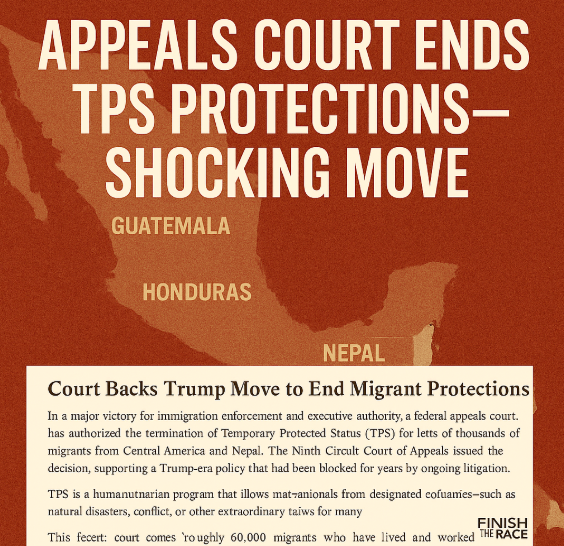In a major victory for immigration enforcement and executive authority, a federal appeals court has authorized the termination of Temporary Protected Status (TPS) for tens of thousands of migrants from Central America and Nepal.
The Ninth Circuit Court of Appeals issued the decision, supporting a Trump-era policy that had been blocked for years by ongoing litigation.
Enjoy A Strong Immunity, Naturally
TPS is a humanitarian program that allows nationals from designated countries facing crisis—such as natural disasters, conflict, or other extraordinary conditions—to remain in the United States without fear of deportation. While it was designed as a temporary relief mechanism, critics say it has become a quasi-permanent status for many migrants.
The recent court decision affects roughly 60,000 migrants who have lived and worked in the U.S. under this temporary designation. Many of them have built families, established careers, and integrated into American communities. The ruling revokes those protections and reopens the door for deportation proceedings.
This legal shift comes at a time when the national debate over immigration is intensifying. From the conservative Christian perspective, the issue of borders and lawfulness is not merely political—it’s spiritual. Scripture upholds both the importance of national order (Romans 13) and the call to care for the foreigner (Leviticus 19:34). Balancing the two requires discernment, not reckless compassion or lawless abandonment.
The decision serves as a reminder that the rule of law is foundational to a free society. While America has long been a haven for the oppressed, that mission must operate within an orderly, lawful framework. Temporary relief cannot become permanent residence through bureaucratic inertia.
The Trump administration has aggressively sought to remove the protection, thus making more people eligible for removal. It’s part of a wider effort by the administration to carry out mass deportations of immigrants.
Supporters of the court’s decision argue that extending TPS indefinitely dilutes the meaning of “temporary” and undermines congressional authority over immigration. If such statuses are never reviewed or allowed to expire, executive orders and court injunctions risk becoming tools for circumventing immigration law entirely.
For Christian conservatives, upholding legal structures honors God’s design for civil order. The Apostle Paul instructed believers to obey the governing authorities because they are established by God. A society that dismisses its laws in favor of unchecked emotion invites chaos and injustice.
That said, this is not a call for cold indifference. Churches and Christian ministries should be the first to offer comfort, guidance, and practical aid to those now facing uncertainty. Many TPS holders are our neighbors. They are people made in the image of God. Regardless of legal status, they deserve dignity, compassion, and spiritual support.
The church must not confuse support for legal reform with political hostility. It is possible—and necessary—to love the individual while supporting reforms that serve the common good. This is a tension Christians are called to live in daily: grace and truth, compassion and justice, mercy and accountability.
Critics of the decision claim it lacks heart and compassion. But mercy, when disconnected from truth, can become sentimentalism. Real compassion must be rooted in a framework that preserves justice for all—not just for those caught in a broken system.
The court’s ruling also sends a strong message to future migrants and policymakers. It reinforces that temporary legal categories are not open-ended and that immigration relief must remain tethered to the original conditions that justified it. Otherwise, temporary policies mutate into permanent loopholes.
Moving forward, higher courts may weigh in, and the administration will have to decide how vigorously to implement the termination of TPS. But the legal precedent is now clearer: the federal government has the authority to review and revoke TPS designations as conditions improve in migrants’ home countries.
For the American church, this is a moment for truth and love. While policy decisions must be made in the halls of power, our response should be shaped by the Gospel. We can honor borders and still break bread with our immigrant neighbors. We can defend sovereignty and still offer sanctuary—spiritual, emotional, and relational.
In sum, the court’s endorsement of the Trump administration’s move to end TPS restores order to a long-abused system. It calls the nation back to a vision of immigration grounded in law, not activism. And it challenges believers to model a better way—one that combines biblical justice with the unshakable hope of Christ.


